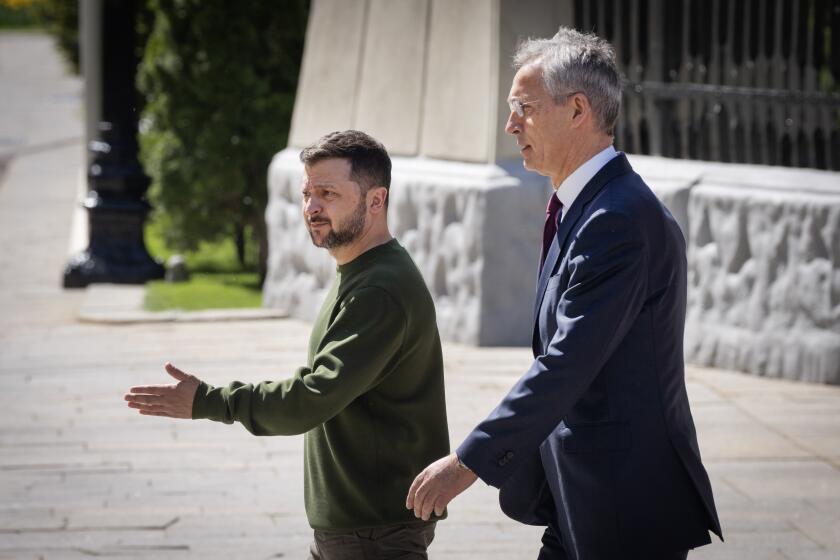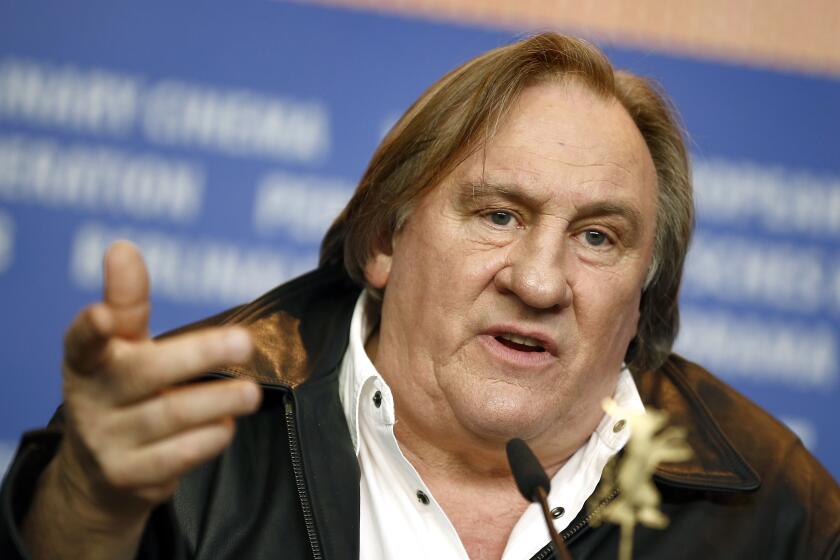‘Hopenhagen’ is the mood as global climate summit opens
After a long day of dire warnings and impassioned pleas about the world’s changing climate, hundreds of Danes and visitors from around the globe bundled themselves against a damp cold Monday and filled the Copenhagen town square.
They jumped with a live rock band, pedaled stationary bikes on display and gazed at a 65-foot rotating globe.
At the party entrance hung a banner, stenciled in green with a play on words that summed up the crowd’s mood: “Hopenhagen.”
The optimism grew from the opening of a much-hyped international climate summit in the Danish capital, even as friction continued among the vast array of government, environment and industry interests surrounding the negotiations. It was a feeling that seemed all but unthinkable this fall, when top world leaders acknowledged they saw little hope of completing a new treaty to curb harmful gas emissions and global warming by the time the summit ends Dec. 18.
In recent days, however, the world’s largest economies have pledged to reduce the greenhouse gas emissions scientists blame for global warming. Summit leaders have won commitments from 110 heads of state, including President Obama, to participate in the negotiations’ final days to push for a broad agreement that would presage a legal treaty.
Emboldened by those announcements, international climate leaders launched their two-week summit with appeals for action, rebuking critics and warning against failure.
“This is our chance,” conference President Connie Hedegaard of Denmark told dignitaries gathered for the opening ceremony. “If we miss it, it could take years before we got a new and better one.”
At a news conference later, top United Nations climate official Yvo de Boer said that delegates were set to heed that call. “What we heard in the conference room this morning is that countries want to deliver that strong and ambitious outcome,” he said.
Late in the day, the Obama administration further buoyed delegates and many environmentalists with news that it is formally declaring greenhouse gases a danger to human health and subject to regulation under the Clean Air Act. That decision allows the Environmental Protection Agency to cut U.S. emissions even if Congress does not pass legislation dealing with climate change.
“We are committed to achieving the strongest possible outcome in the next two weeks,” Jonathan Pershing, the U.S. deputy special envoy for climate change, told reporters, adding later, “There is a deal to be done.”
However, several key players in the climate debate, in and out of Washington, sounded a pessimistic note.
European Union officials expressed dissatisfaction with the proposed emission reductions announced by the United States and China, though they stopped short of saying such concerns might kill a climate agreement.
Some environmental groups and developing nations worried that the process will not end with a legally binding, scientifically meaningful treaty. A group of island nations, which could disappear someday if global seas rise high enough because of warming temperatures, issued an apparent threat to walk away from the talks.
“If a legally binding outcome is not achieved,” said Grenadian diplomat Dessima Williams, speaking for the island nations, “we do not accept [that] a political agreement will be adequate, and we will have to consider our options.”
At the opening of Klimaforum09, a protest event running alongside the formal talks, Canadian author Naomi Klein told a group of activists that “the deal we really need is not even on the table.”
The proceedings also continued to receive dogged criticism from skeptics who say an e-mail scandal at a leading climate study center in Britain has undermined the case that humans are causing global warming.
Republican leaders in Washington renewed calls for the Obama administration to hold off on the so-called endangerment finding on greenhouse gases until the administration investigates thousands of documents hacked from the computers of a leading climate research department at a university in Britain and posted online last month.
Climate change skeptics say the documents undercut the evidence that humans are warming the planet. By not investigating the hacked documents, administration officials are guilty of a “sad abdication of their responsibility to ensure that U.S. policies are not driven by corrupted science and data,” said Rep. Darrell Issa (R-Vista).
Conference leaders in Copenhagen returned fire, saying the e-mail scandal in no way undermines a scientific consensus on climate change. The head of the U.N.’s Intergovernmental Panel on Climate Change, Rajendra Pachauri, called the evidence of global warming “overwhelming” and said the document scandal “shows that some would go to the extent of carrying out illegal acts, perhaps in an attempt to discredit the IPCC.”
Pershing, the climate change envoy, told reporters that the documents and the furor surrounding them would have “virtually no effect at all” on climate legislation pending before Congress.
“The science is incredibly robust,” he said, “and as we look forward, I worry much more about not acting urgently than about what will ultimately be a small blip on this process.”
More to Read
Start your day right
Sign up for Essential California for news, features and recommendations from the L.A. Times and beyond in your inbox six days a week.
You may occasionally receive promotional content from the Los Angeles Times.






